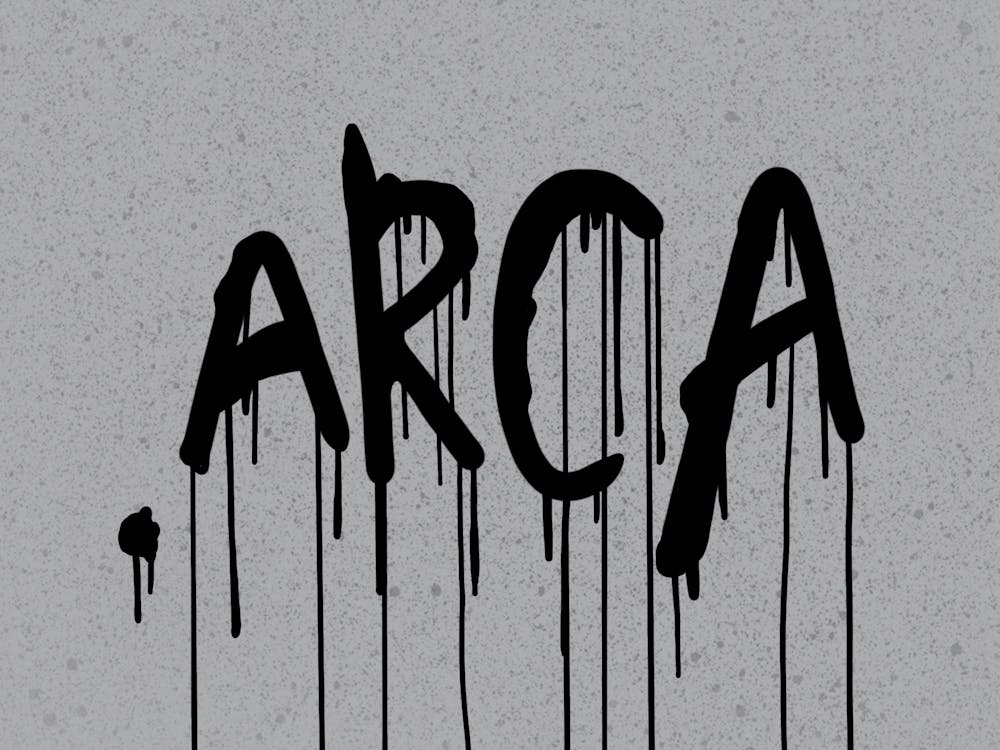Arca's KiCk i is simultaneously the beginning, end, and continuation of multiple eras. The Venezuelan producer Alejandra Ghersi's past four albums, which mostly took the form of abstract electronica, with the notable exception of 2017's self–titled effort, lapsed toward an insular, isolated loneliness. Her prior works were more centered around her own personal growth rather than mass appeal; the music twisted and turned away from easily recognizable meaning and value. On KiCk i, appearing (for the first time) in a full–body shot on one of her album covers, Arca makes a gleefully genre–defying, compelling case for herself as the mutant popstar of 2020.
KiCk i is the first in a series of (prenatal) 'kicks' or a "three–act experimental electronic opera cycle," concluding with an epilogue of piano compositions, mimicking the structure of her Mutant;Faith residency at The Shed last year. KiCk i is overwhelming in its revelatory destruction of genre boundaries and the gender binary. For the first time in her career, Arca opens up to the audience about herself, coming out as a Latina nonbinary transgender woman and accepting collaborators into her chaotic fold in the process. This transparency is reflected in the overwhelming upbeat energy of the club–ready, pop–oriented bangers that make up her latest record, as if the flood gates that obscured so much of her life in the past have finally opened. KiCk i, out of all her works so far, strives the most towards accessibility.
The lead single, "Nonbinary," explores concepts central to the album's conception: self–states, constant fluidity and motion. Its lyrics are braggadocious and arrogant, as Arca urgently raps about her gender identity, enunciating each syllable to the sample of a gun shell hitting the ground. Ghersi is pushing forth her personal boundaries as she urges listeners to do the same, never repeating herself twice—a concept she no doubt mutually agrees with longtime mentor and collaborator Björk about. This nonbinary way of thinking or "having [her] cake and eating it too" is successful on KiCk i. The concept is even reflected in the track order: "La Chiqui" (or "the little girl") directly precedes "Machote," which roughly translates to a stereotypically presenting masculine person.
Björk, with whom Arca created 2015's Vulnicura and 2017's Utopia, sings an excerpt from Antonio Machado's "Anoche cuando dormía" on the combustive and beautiful "Afterwards." Additionally, London DJ Shygirl and new flamenco superstar ROSALÍA make appearances on the rap–inflected cuts "Watch" and "KLK," respectively. Closing out the feature–heavy middle section of the record is fellow transgender experimental electronic pop icon SOPHIE, who lends her production and voice to the thrillingly abstract "La Chiqui."
Arca makes space for each of her collaborators, a testament to her skill as a producer, playing to their respective strengths on the four features of KiCk i. Yet while these songs are notable in their own right, Arca shines most by herself. On cuts such as "Riquiquí" and "Rip the Slit," she gleefully plays with her voice, belting it to hysterical highs and baritone lows on the former, and ballooning it into childish cursive on the latter. Also worth noting is the fact that "Riquiquí" samples quantums from @@@@@. She released the hour–long single/mix back in February, continuing the tradition of her early mixes &&&&& and Entrañas. The late highlight "Machote," easily the most accessible track Arca has released to date, is notable because it both samples "Wound" (from her 2014 effort Xen) and covers Latin Dreams' "Quiero Una Chica." In an interview with Apple Music, Ghersi stated that the Hispanic classic was significant in her formative years in Venezuela. Addictive in its accessibility, Arca's "Machote" subverts the lyrics of the original song. "Quiero un machote," she sings, seductively, "I want a man."
Still, KiCk i doesn't save its goods for the end. The third single "Mequetrefe" buoyantly mutates reggaeton into a beautiful, distorted, whiplashed new form. "Time," out of the four singles, sounds the most wholly new, marked by rotating, glimmering walls of sound. The album also celebrates love like Arca has never before. On "Calor," she pays homage to her partner Carlos. The power ballad "No Queda Nada" includes a mention of her boyfriend as well.
Arca has been even more candid with her fans than in the past, for whom she has specifically created a space on her discord server Mutants1000000. Of all the albums Ghersi has released, her latest LP is the most explicitly personal and idiosyncratic, trading universality for direct references to Venezuela and other personal signifiers, offering herself up as a role model for other queer persons. Take the lyric "mango bajiito" (or "low–hanging fruit") from "Riquiquí," a phrase her father used to say when he found a parking spot. Even "No Queda Nada," which arguably is the most "sad" out of the 12 tracks, sounds as if she is at peace with herself and her current stage of life.
The opening lyrics of "Riquiquí" are "una rosa blanca de metal," a reference to Marta Sanchez's hit song "Desperada." On KiCk i, Arca blossoms like a white metal rose into a deconstructed pop diva, shedding all preconceptions and notions of what she can do as an artist. While she once hid behind distorted creatures and mutated forms on her album covers, KiCk i, in its daring yet accessible approach to self–definition, breaks free from "multiple closets," and proves (yet again) that Arca is limitless.







